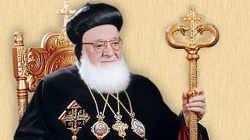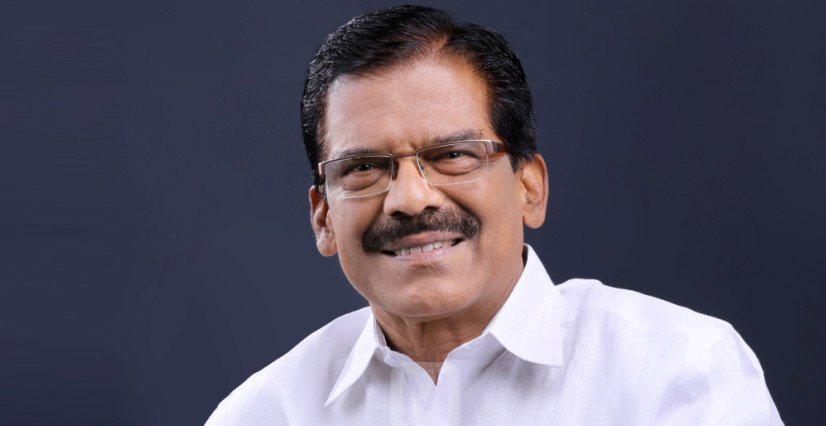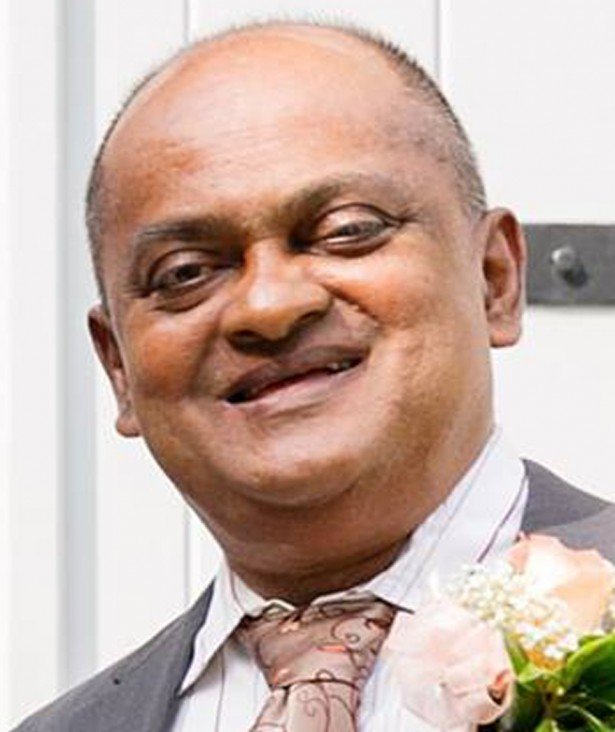His Holiness Moran Mor Ignatius Zakka I Iwas, Patriarch of Antioch and all the East and head of the Universal Syrian Orthodox Church left for his heavenly abode marking the end of an era where this saint of God left the indelible mark of love of Christ in every aspect of his life and the multifaceted role he played in entire Christendom. Patriarch Zakka was born on 21 April, 1933 in Mosul, Iraq in the Iwas family, belonging to the ancient Aramean community mentioned in the Holy Bible. It is from Aramean and Aramaic that Syrian and Syriac evolved. Our Lord Jesus spoke in Aramaic, the main lingua franca during that time in Jerusalem, during his earthly ministry. Aramaic was the predominant official language of the middle east and Persia for centuries and was even used in the remote provinces of Herat, now located in present day Afganistan.
His parents named him Sanharib in memory of the ancient Syrian ruler, father of Mor Behnam, who converted to Christianity. Young Sanharib lost his father when he was 10 and his mother when he was 12 years of age, and was looked after by his relatives. The loss of his parents made a deep impact on Sanharib and after deep contemplation felt the calling of God and decided to pursue a life dedicated to the Lord.
Senharib completed his schooling in Our Lady's Parish school and the St. Thomas Syrian Orthodox Church School, in Mosul. In 1946, he began his theological studies in Mosul’s Mor Ephrem seminary. At the seminary, his birth name was replaced by the name Zakka, and in 1948 he was ordained as a deacon.
In 1954, Zakka decided to take monastic vows and left Mosul to become secretary to the patriarch of Antioch, Ignatius Afram I Barsoum. In 1955 he was promoted to the rank of full deacon. In 1957, Patriarch Ignatius Abram left for his heavenly abode and Mor Ignatius Yaqub III was elected by the synod of the church to be the patriarch of Antioch. In 1933, Patriarch Yakub III had visited the Syrian Orthodox church in Kerala, India as Rabban Abdel Ahad and served as a teacher at the Mor Ignatios Dayro in Manjanikkara. In 1946, he had returned to the Middle East to teach at the Mor Ephrem Seminary in Mosul and was ordained Metropolitan of Beirut and Damascus in 1950 and subsequently got elected as Patriarch.
On 17 November 1957, Patriarch Yaqub III ordained Zakka Iwas a priest and in 1959 as rabban. In 1960, Rabban Zakka travelled to New York, USA for further study in oriental languages and obtained Master’s degree in English at City University. This was followed by another Masters in pastoral theology from the General Theological Seminary.
In 1962 and 1963, Patriarch Yaqub III delegated rabban Zakka as observer at Second Vatican Council in Rome. On 17 November 1963, exactly six years after becoming a priest, he was ordained by Patriarch Yaqub III as Bishop of Mosul and took the episcopal name of Mor Severios according to the tradition. During this time God used Bishop Severios to miraculously discover the relics of apostle St Thomas- the disciple known as doubting thomas who later took the gospel across the seas to distant India in AD 52 and sowed the seeds of an ancient thriving Christian community steadfast on traditions and Christianity of apostolic times even to this day.
In 1964 Bishop Severios accompanied Patriarch Yakub III as his secretary on his trip to India to consecrate the new Catholicose Baselios Augen. This was a glorious and unique moment of unity for the Syrian Orthodox church in Malankara (Kerala) witnessed by multitudes of faithful from all corners of the state. As a personal connection, I would mention a rather amazing fact of coincidence that among the innumerable faithful witnessing the consecration by the Patriarch, included my father Kalluparambil Chacko Mathew of Marukummoottil family, his brothers George and Chandy, my wife’s late father Elias Joseph Vaithara- all in their bachelor life, my mother Susamma’s late father Madathil Idiculla George, renowned orator and convention speaker of the church, and her elder brother late Fr Prof Alexander George.
In 1969, Patriarch Yaqub III appointed Bishop Severios as Archbishop of Baghdad and Basra. Patriarch Yaqub III left for his heavenly abode on July 25 1980. He was a great schlolar who wrote many historical books on Church history and theology and was renowned for his melodious voice and rendition of Beth Gazo, Syriac music. On September 1980 Bishop Severious Iwas was consecreated as Patriarch of Antioch and all the east by Catholicose Baselios Paulose II.
In 1982 Patriarch Zakka made a historic visit to India and travelled extensively throughout the state visiting churches and his flock living even in remote areas. It was during this time that Patriach visted Thiruvananthapuram, capital of Kerala and consecrated the magnificent new church adjacent to the State secretariat and named it St. Peter’s Jacobite Syrian Orthodox church, a moment of thanksgiving for our parish and the whole Syrian orthodox church in Kerala. It is to be remembered that Archbishop Benedict Mor Gregorios of Syro-Malankara church played a key role in arranging a befitting welcome to the Patriarch during this visit. The author, a school boy at that time, vividly remembers with gratitude the blessed moment of kissing the Patriarch’s hand and also having a priceless family photo taken with His Holiness during the occasion.
Patriach Zakka considered the Syriac church in kerala with nearly 2 million faithful, as the jewel in the crown of the Universal Syrian church and visited his flock in Malankara again during 2000, 2004 and in 2008 for the occasion of celebrating the. 80th birth anniversary of Catholicose Baselios Thomas I. One of the enduring images of Patriarch’s affection with kerala is reflected in the unique bond with his spiritual son Bar etho briro Dr. D. Babu Paul.
The patriarch was a great believer in ecumenical movement and reconciliation. In 1984, Patriarch Zakka and Pope John Paul II signed the historic agreement for Communion, bringing an end to the 1500 year old unfortunate schism between the Roman Catholic Church and Syrian Orthodox Church of Antioch which occurred following the debate on the definition of Christ’s dual nature during the Council of Chalcedon in 451 AD. The 1984 joint declaration affirmed that the split of the Universal Church into two groups- Rome and Constantinople (Byzantine) church on one side and Antioch and Alexandria (Coptic) churches on the other side, was an unfortunate development and that difference is only in terminology and culture, with content of faith materially being same.
Ancient Patriarchal sees according to the Council of Nicea convened in 325AD by roman emperor Constantine were Rome, Antioch and Alexandria. Constantinople patriarchate was added in the council of Constantinople in 381 AD, recognizing the role of Constantinople as new Rome.
Following the council of Chalcedon in 451, the ancient church of Antioch had split into Syrian Orthodox and Greek Orthodox (aligned with Byzantine church). In 1054 AD the pro-chalcedon- Roman catholic church and Byzantine church (Constantinople) had a great schism over the filoque clause, with the Constantinople church evolving into the Eastern Orthodox church as against the Western Latin Roman church.
Syrian Orthodox church belongs to the Oriental Orthodox family of churches. Patriarch Zakka was keenly engaged in deep ecumenical dialogue with the Eastern Orthodox church and the Greek Orthodox church of Antioch and succeeded in making progress in the path of reconciliation.
In his first visit as Patriarch to India, Patriarch Zakka made his intentions on unity of Syrian church in India clear by declaring that the doors for reconciliation are wide open. Though this did not see fruition during his life time, the outpouring of grief and affection among all sections of Syrian faithful in Kerala at the time of his separation from this world, point to the unique role and position of the ancient Syrian church of Antioch as a spring of blessing for all.
Patriarch Zakka ruled as the supreme head Universal Syrian Orthodox of for a long 33 and a half years. It is remarkable to note that this period exactly matches the length of our Lord’s earthly life. The patriarch was guided by the Lord in molding and developing leadership by raising up blessed Bishops and leaders, to provide spiritual nurture to his flock, spread across Syria and India including the diaspora spread across the world, to be rooted in their ancient faith.
During the last few years the violence in Syria grieved the Patriarch, especially the loss of life and property of faithful in Syria, the abduction of bishops and the destruction of ancient Aramaic villages of Maloula and Sadad. Even during these calamitous times when he had to shift his headquarters from Damsacus to Lebanon, the Patriarch was ever faithful to the one who had called him from his mother’s womb, and continued his ministry of love and reconciliation. Patriarch Zakka’s love for his flock and all humanity remained in its full radiance throughout his life.
It is relevant to note that the last encyclical of the Patriarch to his flock on the occasion of the great lent was a clarion call to think deeply about where we are going to spend eternity. This was a man of God who was ready to meet his Maker. Patriarch Zakka was called to his heavenly abode during the great lent, the special time of the year when all Christians remember with gratitude and devotion the sacrifice of our Lord Jesus. May our tribute to this saint be to pray and help the suffering masses in Syria and other parts of the world, and to live in reconciliation and love with all our faithful brethren, eschewing rancor and discord. Patriarch Zakka reflected the pure and innocent love of Jesus to all of us. This was truly a saint who lived amongst us.
“ May you go in peace, Holy Father”







Comments